EMAAN E KAMIL
Emaan-e-Kamil website is a dedicated space to explore the timeless legacy of Prophet Muhammad (PBUH), a beacon of guidance, compassion, and moral excellence. Through carefully curated reflections on his Seerah, we aim to present not just historical insights but enduring lessons that resonate with the challenges of our time. The life of the Prophet (PBUH) is not merely a subject of admiration; it is a blueprint for personal transformation and societal reform. In an age marked by uncertainty and moral confusion, His (PBUH) example stands as a testament to the power of truth, patience, and principled leadership. Join us in rediscovering a life that continues to inspire hearts and shape destinies across the world.
ایمان کامل
ایمانِ کامل صرف ایک ویب سائٹ نہیں، بلکہ ایک تحریک ہے ، ایک ایسا مشن جو نبی کریم ﷺ سے سچی محبت اور ختمِ نبوت، ناموسِ رسالت ﷺ، سنتِ نبوی ﷺ اور خالص اسلامی تعلیمات پر قائم ہے۔یہ پلیٹ فارم اُن لوگوں کے لیے ہے جو رسمی ایمان سے آگے بڑھ کر اسلام کو زندگی کا مکمل نظام بنانا چاہتے ہیں اور نبی کریم ﷺ کے ناموس کی عملی حفاظت کو اپنا فرض سمجھتے ہیں۔
ایمانِ کامل کی ویب سائٹ پر آپ کو سیرتِ رسول ﷺ ایک زندہ نمونہ کے طور پر ملے گی جو آج کے فکری و اخلاقی انتشار میں رہنمائی، صبر، عدل اور رحم کے ابدی اسباق دیتی ہے۔یہی وہ مقام ہے جہاں دل جاگتے ہیں، ذہن روشن ہوتے ہیں اور روحیں نکھرتی ہیں۔ہماری دعوت صرف سیکھنے کی نہیں، جینے اور عمل کرنے کی ہے۔یہی ایمانِ کامل کی پکار ہے۔یہی احیائے دین کی راہ ہے۔
سیرت النبی صلی اللہ علیہ وآلہ وسلم
Studying the Seerah of the Prophet ﷺ is a purposeful spiritual journey that introduces you to the enlightening aspects of his blessed life, which continue to inspire minds and guide lives even today. From the days of patience in Makkah to the victories in Madinah and the Prophet’s ﷺ exemplary moral leadership, this journey opens new paths of thought and action. For those seeking guidance and peace, this study marks a meaningful beginning.
سیرت النبی ﷺ کا مطالعہ ایک بامقصد روحانی سفر ہے، جو نبی کریم ﷺ کی حیاتِ طیبہ کے ان پہلوؤں سے روشناس کراتا ہے جو آج بھی دل و دماغ کو جلا بخشتے اور زندگی میں رہنمائی فراہم کرتے ہیں۔ مکہ کے ایامِ صبر سے مدینہ کی فتوحات اور نبی ﷺ کی اخلاقی قیادت تک، یہ سفر فکر و عمل کی نئی راہیں دکھاتا ہے۔ ہدایت و سکون کے متلاشی افراد کے لیے یہ مطالعہ ایک بامقصد آغاز ہے۔
Finality of Prophethood PBUH
ختم نبوت ﷺ
ختمِ نبوت ﷺ اسلام کا بنیادی اور قطعی عقیدہ ہے، جس کی واضح تصدیق قرآن و سنت دونوں میں موجود ہے۔ احادیث مبارکہ میں نبی کریم ﷺ نے فرمایا: “میرے بعد کوئی نبی نہیں” (صحیح بخاری، صحیح مسلم)، جو اس عقیدے کو قطعی اور غیر مبہم طور پر واضح کرتا ہے۔ آپ ﷺ نے خود کو “خاتم النبیین” قرار دیا اور فرمایا کہ میری اور مجھ سے پہلے انبیاء کی مثال ایک خوبصورت عمارت جیسی ہے جس کی آخری اینٹ میں ہوں۔ اس عقیدے پر ایمان رکھنا ایمانِ کامل کا حصہ ہے، اور اس کا انکار اسلام سے انحراف کے مترادف ہے۔ ختمِ نبوت ﷺ کا تحفظ ہر مسلمان کا دینی فرض ہے۔
Social Dealings and the Communal System in Islam
معاملات
(سماجی و معاشرتی نظام)
اسلام ایک مکمل ضابطۂ حیات ہے جو صرف عبادات تک محدود نہیں بلکہ سماجی و معاشرتی معاملات میں بھی مکمل رہنمائی فراہم کرتا ہے۔ اس میں لین دین، تجارت، معاہدات اور مالی معاملات کے اصول واضح طور پر بیان کیے گئے ہیں۔ نکاح، طلاق، وراثت اور خاندانی نظام کے احکام خاندان کو مضبوط بنیاد فراہم کرتے ہیں۔ والدین، ہمسایوں، یتیموں اور غیر مسلموں کے حقوق کی پاسداری اسلامی معاشرے کی خوبی ہے۔ عدل و انصاف، رحم دلی، سچائی اور امانت داری جیسے اصول اخلاقی اقدار کو فروغ دیتے ہیں۔ اسلام کا سماجی انصاف اور فلاحی نظام ایک پرامن، متوازن اور ہمدرد معاشرہ قائم کرنے کی بنیاد ہے۔











